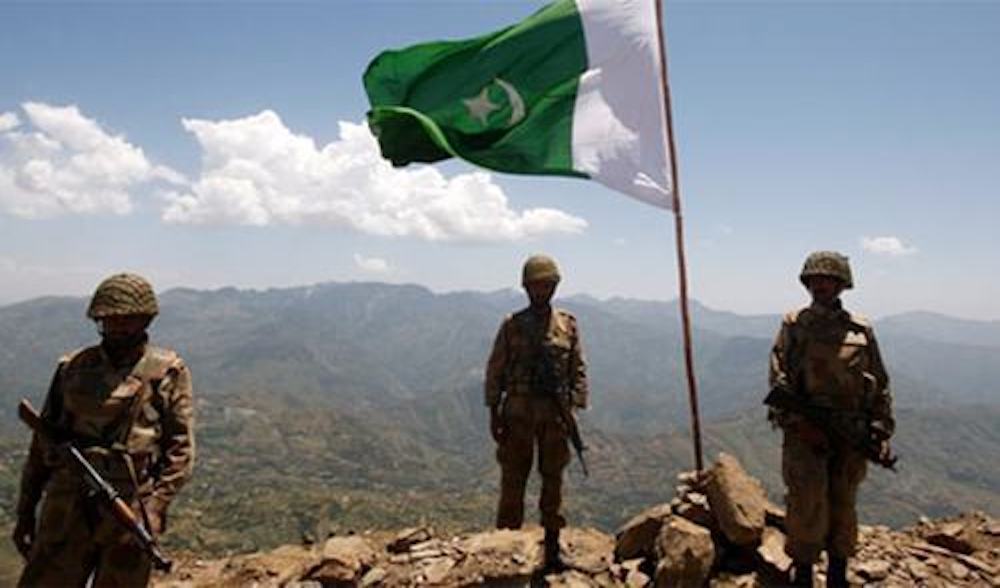TESSA MULLER WRITES – The people of Pakistan are paying a steep price for their government’s equivocation in the War on Terror.
Pakistan’s role in the War on Terror has long been a complicated one. In the aftermath of the 9/11 attacks, Pakistan expressed public support for the U.S.-led Coalition forces in Afghanistan. It contributed to the war effort by permitting the transit of materials across Pakistani territory to U.S. forces in Afghanistan. Pakistan also allowed Americans to launch missile attacks from Pakistan’s lawless border region with Afghanistan.
But Pakistan’s record on terrorism is far from unblemished. For decades now, it has been a home base for terrorism, aiding both the Afghan Taliban and the radical Islamist movements opposing its rival India. Prior to his 2011 death at the hands of U.S. Special Forces, the notorious Al-Qaeda leader Osama bin Laden lived with his extended family in relative comfort in a suburb of Abbottabad (in Pakistan) – for five years! His successor, Ayman al-Zawahiri, likely currently resides in the Afghanistan/Pakistan border region, according to a June 2021 United Nations report.
Mark N. Katz, senior fellow at the Middle East Policy Council, says that “the explanation for [Pakistan’s] ambivalence [in the War on Terror] is that while the United States and Pakistan have some common goals, their priorities differ markedly.” Pakistan’s principal concern is protecting its interest in the (contested) Muslim-majority Indian province of Kashmir. Katz asserts that Pakistan has no hope of actually acquiring Indian-held Kashmir, but the political hit associated with conceding it would be electorally deadly for the Pakistani government. As a consequence, leaders are unwilling to relinquish its claim to Kashmir.
Pakistan supported the rise of the Taliban in the 1990s, in large part because of the Kashmir issue. It wanted control of Afghanistan to shift to an Islamist ally that would sympathize with Pakistan over Kashmir and thus resist Indian influence. Upon seizing power, though, the government of Pakistan found the Afghan Taliban to be a less-than-ideal ally. Particularly concerning to Pakistan was (Taliban founder) Mullah Omar’s decision to offer safe-haven to several radical Islamist groups, including al-Qaeda, in Afghanistan.
This created a major dilemma for the government of Pakistan. According to Katz, “Pakistan has long supported radical Islamist groups that are primarily concerned with Kashmir and India. How could it draw a distinction between these ‘good’ Muslim radicals, on the one hand, and ‘bad’ Taliban ones, on the other — especially when Pakistani public opinion views both favorably? But at the same time, the Pakistani government has not wanted to alienate the United States either (at least not too much).”
The government of Pakistan has yet to fully answer this question, and there have already been some consequences for its failure to do so. Over the past twelve years, Pakistan has been placed on the FATF (Financial Action Task Force) “Grey List” three separate times, most recently in June 2018. (According to the FATF official website, “the FATF identifies additional jurisdictions, on an ongoing basis, that have strategic deficiencies in their regimes to counter money laundering, terrorist financing, and proliferation financing).” So-called “grey list” countries are “jurisdictions under increased monitoring [that] are actively working with the FATF to address [these] strategic deficiencies.” Given that major financial institutions like the IMF and World Bank are affiliated with FATF as observers, a grey-listed country faces challenges in accessing essential international financial instruments. According to a research paper published by the Islamabad-based independent think-tank, Tabadlab, this designation has cost Pakistan $38 billion in GDP losses since 2008.
Can Pakistan have it both ways, or will the international community seek to further punish Pakistan for its ongoing role in terror funding? Given that Pakistan is already twelve years into FATF grey-listing and no change in policy seems forthcoming, it is unlikely that this issue will be resolved anytime soon. Unless something changes, the unwillingness of Pakistan’s government to stake out a hardline position on terrorist groups will continue to cause misery and suffering, both for the victims of terrorist violence and for the economically-depressed citizens of Pakistan.

